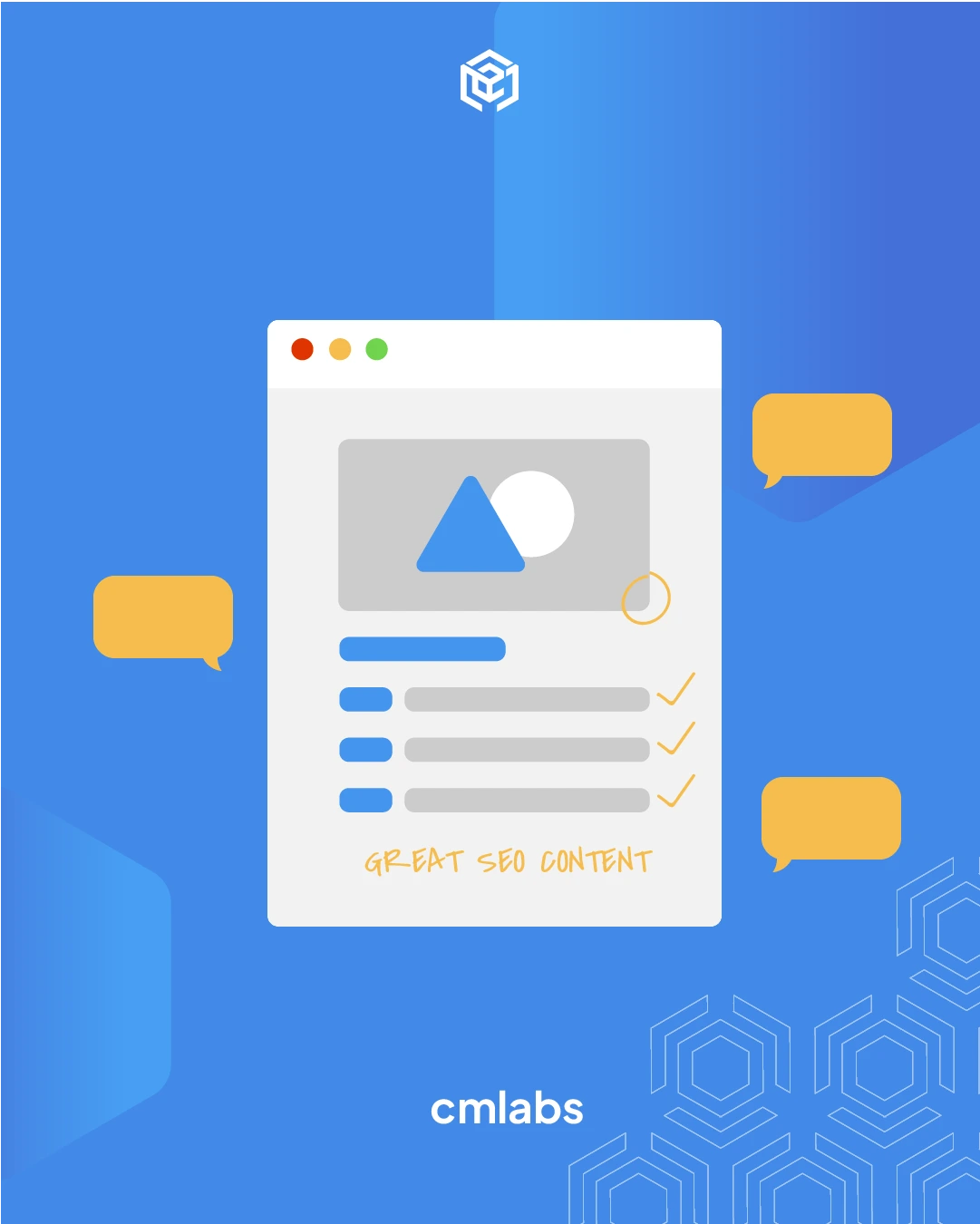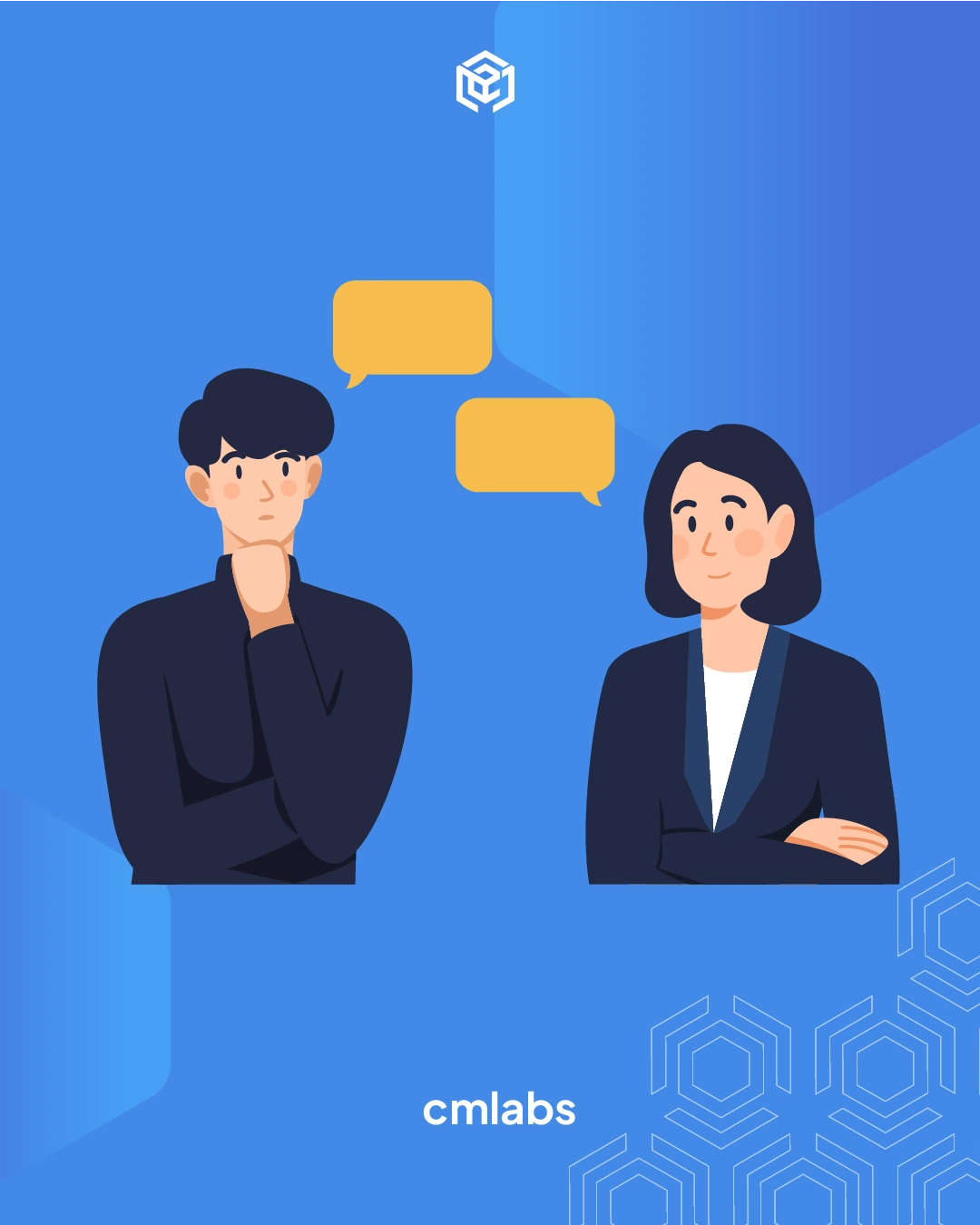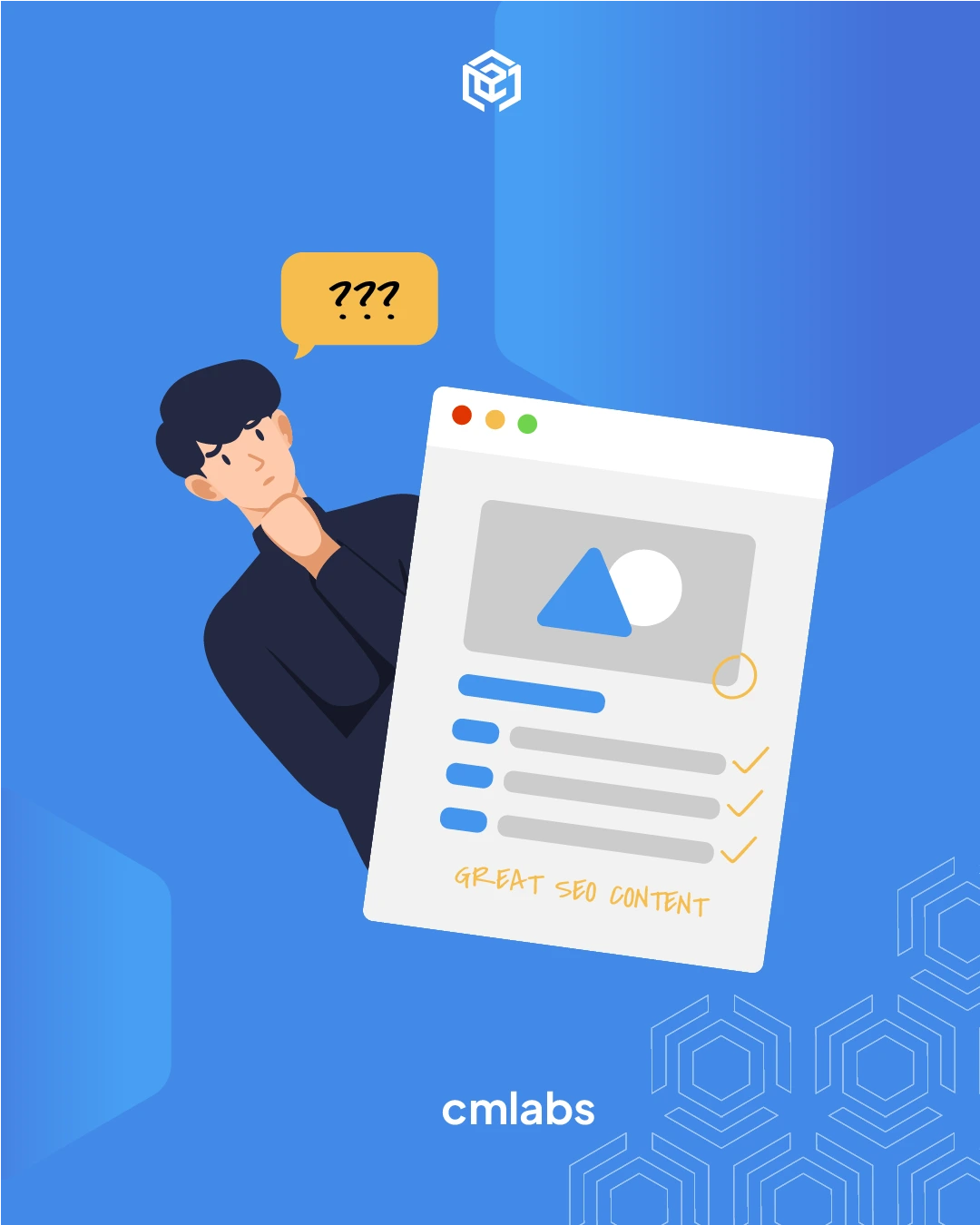We use cookies
This site uses cookies from cmlabs to deliver and enhance the quality of its services and to analyze traffic..
SEO SERVICES
Conduct in-depth technical website audits, strategically develop website projections, and increase your website authority.
ASO SERVICES
Elevate Your App’s Presence with Our Expert ASO Services – Boost Visibility and Drive Downloads!
WRITING SERVICES
We offer a variety of writing services to suit different business necessities. Reach broader audiences or lead specific industries? We've got you covered!
SEOlutions
A unified source of truth!
SEO & Digital Maternity Solution
SEO & Digital Maternity Solution: Leverage Cross-Platform Insights to Elevate Your Strategy with Expert Consultation
SEO & Digital Maternity Solution
Data Solution options:
Starting from Rp200 mio
Reinventing how a company get creative treatments
A new way to get your creative needs done. Agile team, efficient cost, and expedient way in a flexible yet scalable subscription plan!
Creative-as-a-Services
CaaS package options:
Based on Subscription
Pioneer in digital marketing software powerhouse
We’re excited to unveil our new range of Tech Solutions designed to drive your digital success. Whether you’re looking to enhance your website’s performance, streamline your tech stack, or unlock deeper insights from your data, we’ve got you covered.
Starting from Rp250 mio
Our Clients
Research and innovation center for digital transformation
Digital marketing combines technical skills and business knowledge at every stage. For marketing teams, improving budget management efficiency is crucial, as time is an invaluable resource that should be used wisely. At Sequence, we are dedicated to empowering you to optimize efficiency and strategic planning, ultimately enhancing the impact of your digital marketing efforts.
Subscription-based (IDR1,800/keyword)
Our Clients
BeyondSEO
References
SEO Tools for Webmasters
SEO Tools for Writers
SEO Tools
FIND THE SUITABLE PARTNERSHIP FOR YOUR COMPANY
Check out which cmlabs partnership program suits your company
WHITE LABEL SEO
for CorporateYour company is granted exclusive partnership rights to provide SEO services to our important clients, and we will provide a dedicated backend team to support your efforts.
AFFILIATE PROGRAM
for BizdevA new affiliate program is being introduced for skilled marketers and individuals with strong networks, offering commissions of up to 7% for generating profits independently.
DIGITAL AGENCY
for Marketing Partnerscmlabs is an essential partner for digital agencies, providing a unique selling proposition in Search Engine Optimization (SEO).
BACKLINK PARTNERSHIP
for Media / BloggerWe have a vast database of bloggers and media outlets across Indonesia, categorized by region and media type, giving our clients an edge in managing their media and SEO activities.
OFFICIAL TRAINING
We provide ongoing professional development and support to SEO professionals to ensure they are equipped to meet market demands.
JOIN AS CONTRIBUTOR
for Content WriterGreat opportunity for SEO Writers around the world. T&C applied!
ACADEMIC PARTNERSHIP
Through partnerships with universities in Indonesia, cmlabs has helped align academic curricula with industry demands.
Partnership
Sector & Industries
Tell us your SEO needs, our marketing team will help you find the best solution
As an alternative, you can schedule a conference call with our team
Schedule a Meeting?Contact
Survey
We use cookies
This site uses cookies from cmlabs to deliver and enhance the quality of its services and to analyze traffic..
Last updated: Jun 19, 2023
If you pay close attention, the difference between B2B and B2C can be seen immediately.
B2B (business-to-business) is a business that sells its products or services to other businesses.
While businesses that use the B2C (business-to-consumers) model sell products or services directly to end customers.
For more details, the differences between B2B and B2C are in customer relations, branding, decision-making processes, target audiences, and ad copy.
Here's the explanation:
The first difference between B2B and B2C is customer relations. B2B focuses on building strong, long-term relationships between companies.
This condition occurs because B2B businesses have a priority to generate leads that meet customer business needs and solutions. As a result, B2B businesses have a more personal relationship with customers.
On the other hand, B2C businesses have the goal of encouraging consumers to be interested in the product and then make a purchase. To do this, the B2C model usually uses a marketing funnel.
Also, this business relies heavily on efficiency and minimizing the amount of time spent getting to know the customer.
As a result, customer relationships are transactional in nature and focus on the individual needs of consumers.
B2B and B2C marketing strategies also have differences in branding. B2B businesses aim to position themselves in the market to drive brand recognition and lead generation.
Branding in the B2B business will focus on reputation, trust, and solid business relationships between companies. This involves conveying a professional message and highlighting relevant business values.
Unlike the case with B2C businesses, branding in this business means doing branding to be more oriented towards an attractive brand image, emotionally engaging, and providing a positive user experience.
For this reason, B2C businesses rely heavily on marketing that is creative and evokes consumer emotions. As a result, these businesses can create customer loyalty, connect emotionally with customers, and encourage them to make purchases.
Another difference between B2B and B2C is the decision-making process. The decision-making process in B2B involves a lot of communication between businesses to determine the fit between the parties.
During the decision-making process, B2B businesses must evaluate the needs of their company or individual workers. Sometimes this involves both rational and emotional motivations.
Rational motivation is usually influenced by financial circumstances. Meanwhile, emotional motives are emotional relationships with companies or individual workers.
In B2C business, the decision-making process is more often done by individuals. The process is usually influenced by emotional factors, personal preferences, and price considerations.
The striking difference between B2B and B2C is the target audience. B2B businesses usually operate in a niche market. This market must understand the target audience in depth.
The target audience of B2B usually focuses on institutions or stakeholders. Examples are companies, business owners, or professionals involved in the business decision-making process.
Unlike B2B businesses, B2C businesses are in the market on a larger scale. This market has a target audience of end consumers who are looking for products or services for their personal needs.
To attract this target audience, B2C uses marketing funnels, one of which is AIDA. In the early stages of the marketing funnel, this business will carry out marketing strategies to arouse consumer emotions and get some quality leads. Later, these leads will be converted into sales.
The difference between B2B and B2C also comes from the approach of their ad copy.
In B2B business, the copy tends to focus on product advantages, business solutions, and practical benefits offered to companies. The messages conveyed are usually more rational and fact-based.
Meanwhile, ad copy for B2C businesses uses an approach that can persuade customers to click on ads.
The messages tend to be more emotional, evoke feelings, and highlight direct benefits for consumers, such as convenience, satisfaction, or increased social status.
SEO-based website optimization for B2B and B2C businesses has differences on several sides, especially in keyword research, content marketing, and traffic volume.
In B2B, keyword research is carried out by paying attention to specific niche industry queries. Meanwhile, B2C prioritizes the use of keywords that are common in everyday life.
As for content, B2B aims to educate or provide informative content about business products and services.
B2C itself is concerned with content that brings in lots of visitors by increasing audience reach.
On the traffic side, B2B is not so concerned with high search volume compared to B2C, which uses general keywords.
More B2B SEO traffic comes from visitors who are really looking for the company's needs. Meanwhile, B2C audiences are not segmented like SEO audiences in B2B.
The differences between B2B and B2C make the above questions not have definite answers.
The decision on which business model is better depends largely on the background, expertise, and knowledge that can be offered to the market.
The most obvious difference between B2B and B2C is the market.
B2B operates in a more narrow and segmented market. Therefore, this business must focus on customer quality. Incoming leads must be relevant to the business and have the opportunity to convert into customers.
To get quality leads, B2B businesses cannot use the same marketing style as B2C businesses. B2B business marketing must focus on educating businesses about solutions through the products or services being sold.
This can be done by creating content that leads to a deeper understanding of products or services, business benefits, case studies, and customer testimonials.
In order for content to reach relevant audiences, the right SEO strategy is needed. The implementation of SEO for B2B businesses can use specific and industrial keywords, such as long-tail keywords, that reflect the needs and problems of the target audience.
On the other hand, B2C businesses are in a wider market than B2B businesses.However, this market has tougher competition.
In order to be competitive, B2C businesses must be able to influence consumer buying decisions as quickly and widely as possible.
The B2C business model must have a marketing strategy that focuses on arousing consumer emotions so that it can bring in lots of visitors.
For that, we need content that is interesting, informative, and can connect with the audience.
This content can be published on various platforms, one of which is a search engine. Publishing content for search engines requires an SEO strategy to get optimal results.
SEO strategies for B2C businesses can use general keywords that are relevant to the products or services offered.
These keywords will direct consumers to content that can relate to their personal needs, lifestyle, and preferences. From there, consumers can be encouraged and converted to take the desired action.
WDYT, you like my article?
Couldn't find result for "Mulki" try to search with different keyword
Suggestion:
Tell us your SEO needs, our marketing team will help you find the best solution
As an alternative, you can schedule a conference call with our team
Schedule a Meeting?



cmlabs Jakarta Jl. Pluit Kencana Raya No.63, Pluit, Penjaringan, Jakarta Utara, DKI Jakarta, 14450, Indonesia
(+62) 21-666-04470These strategic alliances allow us to offer our clients a wider range of SEO innovative solutions and exceptional service.

Psst! Hey there, SEO Stats and Tools SEO company! If you've ever planned of conquering the Kazakhstan market, you've come to the right place!